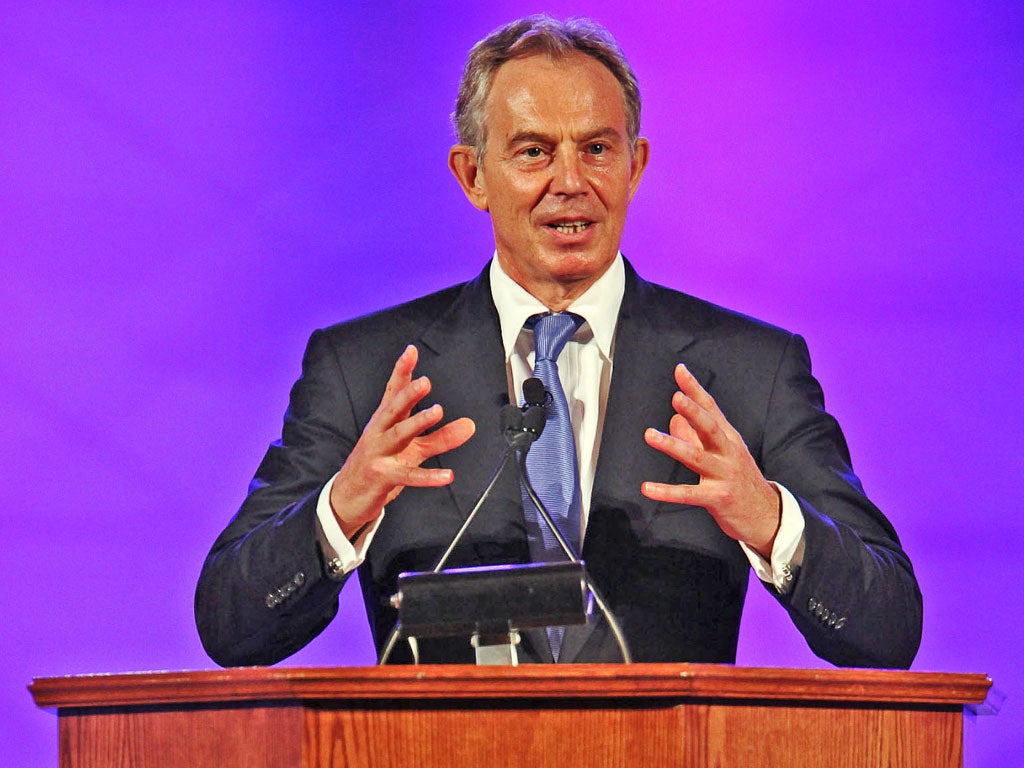John Kampfner: If Blair wants to play elder statesman, let him

I have a confession to make that will destroy what cred I ever had. I loved the Spice Girls. When my daughters were small, they would sit glued to the box watching the glammy, glitzy airheads. I was gutted when I couldn't come with them to a concert, but I did make it to Destiny's Child.
Ah, the mid to late 1990s... a time when newspaper restaurant reviews would portentously advise readers what to wear, when columnists would get cross about supermarket trolleys with wobbly wheels. The money was easy, life was relatively straightforward (unless you were a Kosovan/Rwandan/Bosnian), and government ministers saw the chatshow sofa as political nirvana.
Cue Tony Blair. Cast your mind back to 1997. What was there not to like? Cool Britannia; Ginger Spice's sequin Union Jack dress; D:Ream telling us things could only get better. Foreign statesmen queued to be seen with the incoming prime minister; business leaders ate out of his hand – and the feeling was mutual.
Now, a decade and a half on, it is testament to the man that the whiff of a suggestion of a return to domestic politics has sent commentators into paroxysms of despair or joy. There is no reason for either. The evidence, for a start, is flimsy. Blair joins Ed Miliband for motivational talk about sport ahead of the Olympics: so unspectacular. Blair chats with Labour backbenchers: so to be expected. Blair replaces one spin doctor in his foundation-cum-money-spinning-enterprise with another spin doctor: so very Blair.
True to form, the Twittersphere went into overdrive, demanding a response. Miliband The Younger let it to be known that he was seriously relaxed by King Tony's return. He had no choice but to say this, but there is truth in the spin, too. The Labour leader is having a relatively good 2012, as David Cameron sinks further into the Murdoch and double-dip mire. The threat posed by those still smarting at his brother's political defenestration has waned.
But beyond the hype, does Blair really want to get back into the world of growth versus austerity, NHS reform, and welfare-cutting wheezes? I doubt it. Blair has not hung around since he was unceremoniously ousted from Downing Street by the voracious, but ultimately hapless, Gordon Brown. His five organisations apparently employ more than 100 people, with a gross income of £12m and a blessedly tiny tax bill to match. He is jetted around the world to help adoring foreigners save the world.
Although I am not privy to his innermost thoughts (he didn't enormously appreciate my book Blair's Wars), I would submit that he is not as frustrated by his career path since 2007 as some might say. Moreover, as any life coach might advise, it is best not to look back.
There is nothing wrong in Blair performing the role of elder statesman. Paddy Ashdown sometimes speaks for Nick Clegg or whispers in his ear; Michael Heseltine does odd jobs for Cameron, while John Major sounds sagacious in his occasional appearances on the airwaves.
As a man who won three general elections, Blair still has a contribution to make, if he wishes to make it – on the sidelines. His perspective is useful. He bears the scars of trying to reform public services, so may have interesting things still to say. He was brave on the social reforming front, largely craven to The Sun and the Daily Mail on criminal justice.
It is when Iraq is mentioned that the debate inevitably overheats. The historical reckoning will be informed by Sir John Chilcot's verdict, which may finally deliver its report by the end of this year. I have long argued that accusations of deliberate deception are counter-productive. After his successes in military intervention in Kosovo, Sierra Leone and Afghanistan (initially), Blair allowed the plaudits to go to his head. He had good intentions, but was swept along by his hubris and his pre-9/11 mindset.
In any case, it is now hypothetical. The shift in balance of power from West to East, coupled with the economic malaise and deep defence cuts suggest that Iraq and Afghanistan mark the closing of a chapter in military history. We might be able to afford the odd air strike here and there, but any meaningful British involvement in a ground invasion under the guise of "humanitarian intervention" is no more.
For right or for wrong, all this belongs to a different era. One of the curiosities of Cameron's tenure is his continued use of Blair as his reference point. What may have pertained to the Nineties – ingratiating oneself with bankers, business leaders, Murdochs and their like – is, as events have shown, unlikely to be helpful in solving today's problems. In a similar way, the Thatcher era is associated with the Miners' Strike, the Falklands, Gordon Gekko and Harry Enfield.
A frontline return for Blair would be the political equivalent of a revival of the Spice Girls. Like Victoria Beckham, he is surely too busy with his lucrative lifestyle.
John Kampfner is the author of 'Blair's Wars' and 'Freedom For Sale'

Join our commenting forum
Join thought-provoking conversations, follow other Independent readers and see their replies